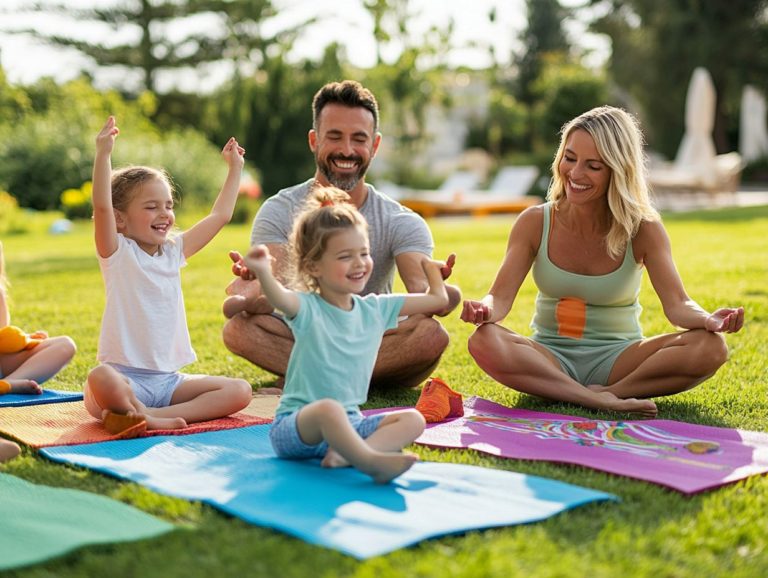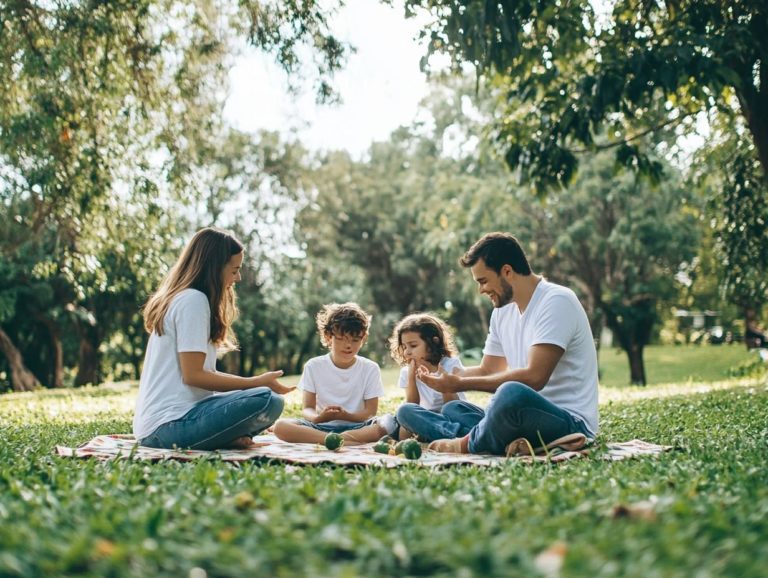Mindfulness and Parenting: Finding Balance
In today’s fast-paced world, mindful parenting can often feel like navigating a whirlwind. This leaves you with little opportunity for self-reflection and emotional connection.
Mindfulness provides a powerful antidote, inviting you to engage fully in the present moment and practice principles that enhance emotional regulation.
This article delves into the essence of mindfulness and its potential to transform your parenting journey. It offers strategies for stress management and coping mechanisms.
From alleviating stress and enriching relationships to practical techniques for weaving mindfulness into your daily routine, you’ll discover how to cultivate a balanced approach that nurtures not only you but also your children.
Contents
- Key Takeaways:
- What Is Mindfulness? Insights from Mindfulness Experts
- How Can Mindfulness Benefit Parents? Insights on Family Dynamics
- The Importance of Mindfulness in Parenting
- What Are Some Mindful Parenting Techniques? Effective Methods for Daily Routine
- 4. Setting Boundaries and Saying No
- How Can Parents Find Balance Between Mindfulness and Parenting?
- 1. Prioritizing Self-Care
- Frequently Asked Questions
- 1. What is mindfulness and how can it help with parenting?
- 2. Simple Ways to Bring Mindfulness into Your Busy Day!
- 3. How can I incorporate mindfulness into my daily routine as a busy parent?
- 4. Can mindfulness help improve my relationship with my child?
- 5. Is it possible to practice mindfulness while juggling multiple tasks as a parent?
- 6. Can mindfulness also benefit my child?
Key Takeaways:
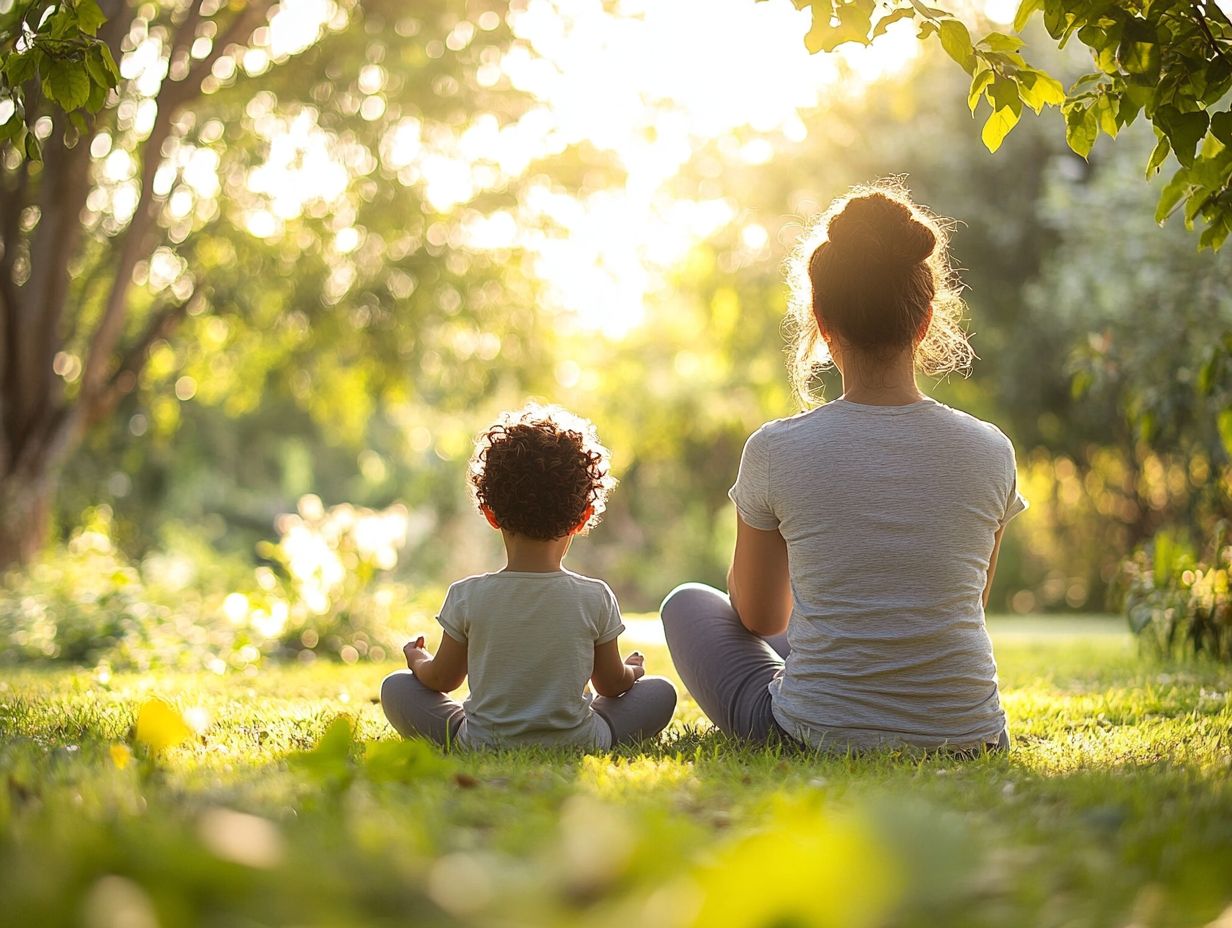
- Mindfulness can reduce stress and anxiety for parents, leading to a more peaceful and fulfilling parenting experience.
- Practicing mindfulness can improve parent-child relationships by increasing patience, empathy, and self-awareness.
- Finding balance between mindfulness and parenting involves prioritizing self-care, setting realistic expectations, and practicing mindful discipline while letting go of perfectionism and parenting guilt.
What Is Mindfulness? Insights from Mindfulness Experts
Mindfulness is an enriching mental practice deeply rooted in Buddhist traditions and positive psychology. It invites you to embrace a heightened awareness of the present moment.
This practice nurtures emotional regulation and self-care, enabling you to engage fully with your thoughts and feelings without judgment. By adopting an intentional approach to life, you can experience a profound transformation in how you relate to yourself and others, including through mindful parenting.
Through mindfulness practices such as meditation and deep breathing, you can cultivate emotional awareness and self-compassion critical tools for navigating the daily challenges of parenting. These practices help manage stress and enhance your overall mental well-being.
Embracing mindfulness opens the door to a balanced and fulfilling life, promoting strength and personal development through practices like mindful awareness and self-compassion.
How Can Mindfulness Benefit Parents? Insights on Family Dynamics
Mindfulness presents a wealth of benefits for parents, greatly elevating both their well-being and their ability to deftly navigate the complexities of family dynamics.
By embracing mindful parenting strategies, you can enhance your emotional regulation and communication skills, creating a more compassionate and understanding environment for your children. This approach, rooted in positive psychology, offers practical parenting methods for everyday mindfulness and balance in life.
This intentional approach helps manage stress and the inevitable challenges that arise. As a result, you ll cultivate stronger parent-child relationships and deepen the connection within your family.
1. Reduces Stress and Anxiety
Practicing mindfulness can significantly reduce your stress and anxiety, equipping you with effective coping mechanisms to handle the emotional triggers you encounter in daily life.
By incorporating mindfulness into your routine, you can create a calmer living environment that fosters improved emotional regulation and resilience. This approach not only helps you manage your own stress but also models healthy emotional responses for your children, promoting a more harmonious family dynamic.
Influential mindfulness experts like Jon Kabat-Zinn advocate for these practices to enhance parental well-being.
Techniques such as meditation, guided imagery, and other mindfulness practices can be effortlessly integrated into your everyday activities. Whether it’s savoring your morning coffee or while waiting for the bus, simple breathing exercises like deep abdominal breathing can be practiced anytime, even during those hectic moments when emotions run high.
For instance, when faced with a challenging situation, taking a moment to close your eyes and focus on your breath can provide immediate relief. Setting aside just a few minutes for meditation before bedtime can help you wind down and reflect on your day, ultimately fostering a sense of peace that benefits not just you, but the entire family.
The Importance of Mindfulness in Parenting
2. Improves Parent-Child Relationships
Mindfulness significantly enhances your relationship with your child by fostering interactions that nourish emotional support and understanding.
Practicing mindfulness helps you understand your child’s perspective, paving the way for more empathetic communication and deeper family connections. This intentional approach creates an environment where your child’s emotions are validated and their needs are met with compassion and patience. Experts like Laura Markham and Myla Kabat-Zinn emphasize the importance of mindful interactions for building strong parent-child relationships.
Engaging in mindful interactions like actively listening during conversations or maintaining eye contact allows you to fully absorb what your child is expressing. By taking a moment to reflect before responding, you can skillfully navigate emotionally charged situations, diffusing potential conflicts and building trust.
Parenting experts such as Anne Lamott and Richard Brady recommend these practices to enhance family dynamics.
Incorporating simple practices, such as shared breathing exercises or mindful play, can transform everyday moments into cherished bonding opportunities. This attentive presence not only deepens your understanding but also enables your child to express their feelings openly, fostering a sense of security and reinforcing the emotional tapestry that binds your family together.
3. Increases Patience and Empathy
Mindful parenting practices play a crucial role in enhancing your patience and empathy essential qualities for navigating the inevitable challenges of raising children.
By nurturing emotional awareness and self-compassion, you can develop a more empathetic understanding of your child s feelings, which leads to more thoughtful responses in stressful situations. This empathetic approach is backed by studies about behavior, underscoring the significance of seeing things from your child’s perspective and responding with patience.
Consider a scenario where your child is throwing a tantrum out of frustration with their homework. In that moment, a mindful parent takes a deep breath and reflects, resisting the impulse to react hastily.
Instead of resorting to scolding, you might kneel down to your child s level, acknowledge their feelings, and foster an open dialogue about what they re struggling with. Influential figures in behavioral studies, such as Allison Gopnick, advocate for this empathetic approach to effectively address children’s emotions.
These instances illuminate how emotional awareness can reshape family dynamics, nurturing stronger bonds while creating a home environment where children feel understood and valued.
Over time, this approach cultivates a more harmonious family atmosphere, as everyone learns to express their emotions in a healthy and respectful manner.
4. Enhances Self-Awareness and Self-Care
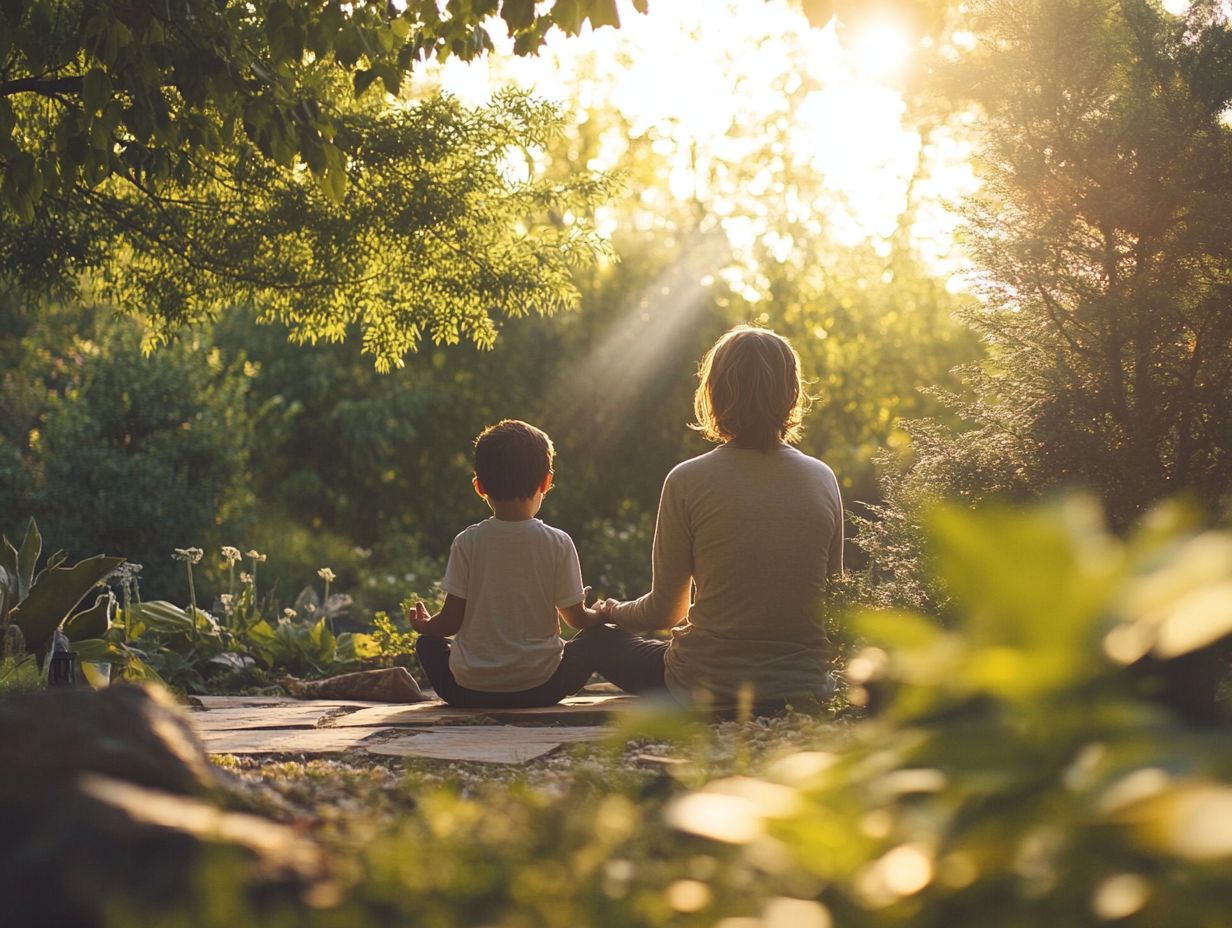
Engaging in mindfulness significantly enhances your self-awareness and promotes self-care practices that are essential for personal growth and emotional regulation.
As you become more self-aware, you can identify your own emotional triggers and establish healthy boundaries, creating a more harmonious balance in your life. This intentional approach not only supports your well-being but also models the importance of self-care to your children, nurturing resilience in parenting and a resilient family dynamic.
By incorporating strategies like journaling, deep breathing exercises, guided meditation, and mindful communication, you can deepen your self-awareness, helping you recognize patterns in your thoughts and behaviors.
These practices provide a safe space for self-reflection and understanding, ultimately leading to more empathetic interactions with your children. As you embrace self-care routines, you cultivate an environment where your children feel valued and understood, laying the groundwork for open communication and emotional intelligence.
Imagine how this cycle of mindfulness and self-awareness can transform your personal growth! This cyclical relationship fosters your personal growth and equips both you and your children with essential tools for navigating life’s challenges together, improving your mental health and overall well-being.
Start incorporating these techniques today for a stronger family connection!
What Are Some Mindful Parenting Techniques? Effective Methods for Daily Routine
Mindful parenting techniques provide you with practical strategies to weave mindfulness into your daily routines, enriching your interactions with your children and nurturing emotional awareness.
Consider incorporating practices like deep breathing, active listening, and establishing a gratitude routine. These methods not only foster mindful communication but also offer essential emotional support, improving your parenting strategies.
Embrace these mindful practices to transform your parenting experience! By integrating them, you can navigate the challenges of parenting with greater ease, ultimately cultivating a warm and nurturing family environment that enhances family connections.
1. Deep Breathing and Meditation: Essential Techniques for Stress Management
Deep breathing and meditation serve as essential mindfulness techniques that enable you to manage stress and improve your ability to handle emotions. By dedicating just a few moments each day to practice deep breathing or engage in meditation, you can cultivate a sense of calm and presence that transforms your parenting approach.
This practice not only enriches your emotional landscape but also creates a serene environment for your children, fostering their emotional well-being and enhancing your communication skills.
You can set aside just ten minutes for guided meditation to establish a routine that nurtures both focus and emotional balance, promoting positive psychology and well-being. Incorporating simple techniques like the 4-7-8 breathing method or mindful observation can markedly enhance your daily life.
The 4-7-8 method invites you to inhale for four counts, hold for seven, and exhale for eight a technique that can be effortlessly integrated into brief breaks throughout your day.
You may find it beneficial to explore resources such as mobile apps or online videos that offer structured meditation sessions. Adding a meditation practice into your daily routine can be particularly effective, as it allows you to transition smoothly from daily activities into a state of mindfulness. This practice can lead to improved stress management, mental health, and a more harmonious family atmosphere.
2. Practicing Gratitude
Practicing gratitude is a powerful technique in positive psychology that enhances emotional awareness and strengthens the bonds within your family. By establishing a gratitude routine, you can cultivate a positive mindset that encourages your children to do the same, promoting resilience and emotional well-being.
This practice enriches your relationship with your children and nurtures a supportive family dynamic grounded in appreciation and love.
To implement a gratitude routine, your family can engage in simple yet impactful activities. For example, consider creating a family gratitude jar where everyone can jot down things they re thankful for and then read them together on special occasions. Starting a gratitude journal where each family member records their daily blessings can serve as a meaningful tool for self-reflection and growth.
You might also schedule a weekly gratitude circle during mealtime, where everyone shares one highlight from their day. This practice enhances communication and fosters a deeper emotional connection. Such routines cultivate a culture of gratitude and contribute to your family s overall well-being, promoting happiness and a richer appreciation for life s simple pleasures.
3. Active Listening and Non-Judgment
Active listening and non-judgment are pivotal elements of mindful communication that elevate emotional support and nurture healthy family dynamics. By fully engaging in conversations with your children and responding without judgment, you create an environment where they feel genuinely heard and valued.
This mindful approach strengthens your relationship with your children and fosters a sense of belonging and trust within your family.
To cultivate these vital communication skills, you can adopt techniques like:
- Maintaining eye contact
- Reflecting back what your children express
- Asking open-ended questions
This encourages them to share their thoughts and feelings freely, knowing they won’t face criticism. Embracing moments of silence during conversations allows for deeper reflection, showing your children that their opinions truly matter.
By weaving these mindful practices into your daily interactions, you enhance your communication skills and lay the groundwork for a supportive atmosphere where challenges can be faced together, thereby reinforcing the bonds that hold your family tightly together.
Start implementing one mindful technique today to improve your parenting journey!
4. Setting Boundaries and Saying No
Setting boundaries and learning to say no are essential elements of thoughtful parenting that greatly enhance your self-care.
By establishing healthy boundaries, you create a balanced environment that honors both your needs and those of your children. This intentional approach helps you manage stress and models healthy relationship dynamics for your kids, teaching them the importance of self-care and personal limits.
For example, when you set aside specific times for family activities, you enjoy quality moments together and demonstrate that your personal time is just as valuable.
Utilizing strategies like clear communication and consistent reinforcement allows you to navigate tricky situations with greater ease. This enables your children to express themselves freely, significantly contributing to their emotional intelligence and understanding of healthy boundaries.
Well-defined boundaries cultivate a nurturing space for growth, allowing your children to learn about compromise and respect. Ultimately, this leads to improved emotional well-being for your entire family and contributes to the overall balance of your home.
How Can Parents Find Balance Between Mindfulness and Parenting?

Striking a balance between mindfulness and parenting is crucial for your overall well-being and enhancing your family’s dynamic. By integrating mindfulness principles into your daily routines, you can manage your time effectively and cultivate a sense of equilibrium in life.
This intentional approach reduces parenting guilt and fosters resilience in your parenting journey, creating a healthier and more harmonious home environment for everyone involved. It also highlights the benefits of mindful awareness in everyday practices.
1. Prioritizing Self-Care
Prioritizing self-care is essential for achieving balance in both parenting and mindfulness. By acknowledging the significance of your well-being, you establish healthy boundaries that support stress management and effective emotional regulation.
This practice boosts your well-being significantly and serves as a powerful example of self-care for your children, nurturing a culture of mindfulness within your family.
Engaging in self-care practices helps set a precedent of self-compassion and emotional awareness. Regular self-care activities whether it s carving out time for your hobbies, getting some exercise, or enjoying quiet reflection can rejuvenate you and elevate your mood.
These little acts of care allow you to recharge and enhance your capacity to care for your children effectively, showcasing the importance of mindful awareness and personal growth.
Establishing clear boundaries around work, personal time, and family responsibilities can significantly reduce feelings of overwhelm and foster a more harmonious home environment. These boundaries teach your children to respect their own needs and those of others, promoting empathy and understanding within your family dynamics.
In this way, self-care not only benefits you but also instills vital life lessons in your children, nurturing their emotional growth and resilience.
2. Setting Realistic Expectations
Setting realistic expectations is essential for you as a parent striving to balance mindfulness with your parenting responsibilities. Recognizing the limitations you and your children face can alleviate parenting guilt and nurture a more supportive home. This mindful approach aids in emotional regulation and enhances your resilience, fostering a more enriching family dynamic.
Realistic expectations arise from understanding typical developmental milestones. This understanding enables you to devise more effective strategies that cater to your child’s unique needs. Instead of pressuring your toddler to share their toys flawlessly, model sharing behavior and celebrate small victories. This approach alleviates frustration and nurtures emotional intelligence, fostering a positive parent-child relationship.
Engage in family discussions about challenges and collaboratively set achievable goals to create a nurturing atmosphere. Embracing the imperfections of parenting cultivates a space where emotional well-being flourishes, ultimately strengthening relationships and deepening connections among family members. This approach aligns with principles of positive psychology and behavioral science.
3. Practicing Mindful Discipline
Practicing mindful discipline employs parenting strategies that emphasize emotional support and constructive communication. With mindful discipline, you tackle behavioral challenges through empathy and understanding, enhancing your family connection while imparting invaluable life lessons. This approach nurtures a loving environment and fosters emotional regulation and resilience in your kids.
Weave mindfulness into your daily interactions to cultivate a more harmonious home where your children feel safe to express their thoughts and emotions. One effective strategy is to model active listening, ensuring your children feel heard and valued during discussions about their behavior or feelings.
Establishing routines promotes predictability while allowing space for open dialogue about emotions. Engage in self-reflection to examine your reactions to various situations and adjust your responses to reinforce positive behavior rather than resorting to punishment. This practice aligns with mindfulness benefits and can lead to personal growth.
These practices create a supportive atmosphere that enables your children to navigate their emotions and challenges with greater ease.
4. Letting Go of Perfectionism
Letting go of perfectionism is crucial for you as a parent striving to embrace a mindful parenting approach rooted in self-compassion and emotional awareness. Releasing unrealistic expectations of perfection helps you navigate parenting challenges with greater ease and grace, creating a nurturing environment for both you and your children. This shift enhances your well-being and fosters resilience and emotional growth in your kids.
Embracing your imperfections allows you to model healthy coping strategies and shows your children that it’s perfectly okay to make mistakes. This understanding cultivates a family atmosphere where open communication thrives, enabling your children to express their feelings without the fear of judgment. This approach also aids in managing emotional triggers and developing effective coping mechanisms.
Prioritizing emotional awareness provides better insight into your reactions and triggers, fostering self-awareness that positively influences your parenting style. Practicing self-compassion alleviates the pressure of meeting societal expectations, enabling you to forge a more authentic connection with your children. This mindful approach enhances your emotional support and communication skills.
Ultimately, this balanced dynamic nurtures a sense of security, belonging, and emotional regulation, creating a loving environment where you and your children can flourish together.
Frequently Asked Questions
1. What is mindfulness and how can it help with parenting?
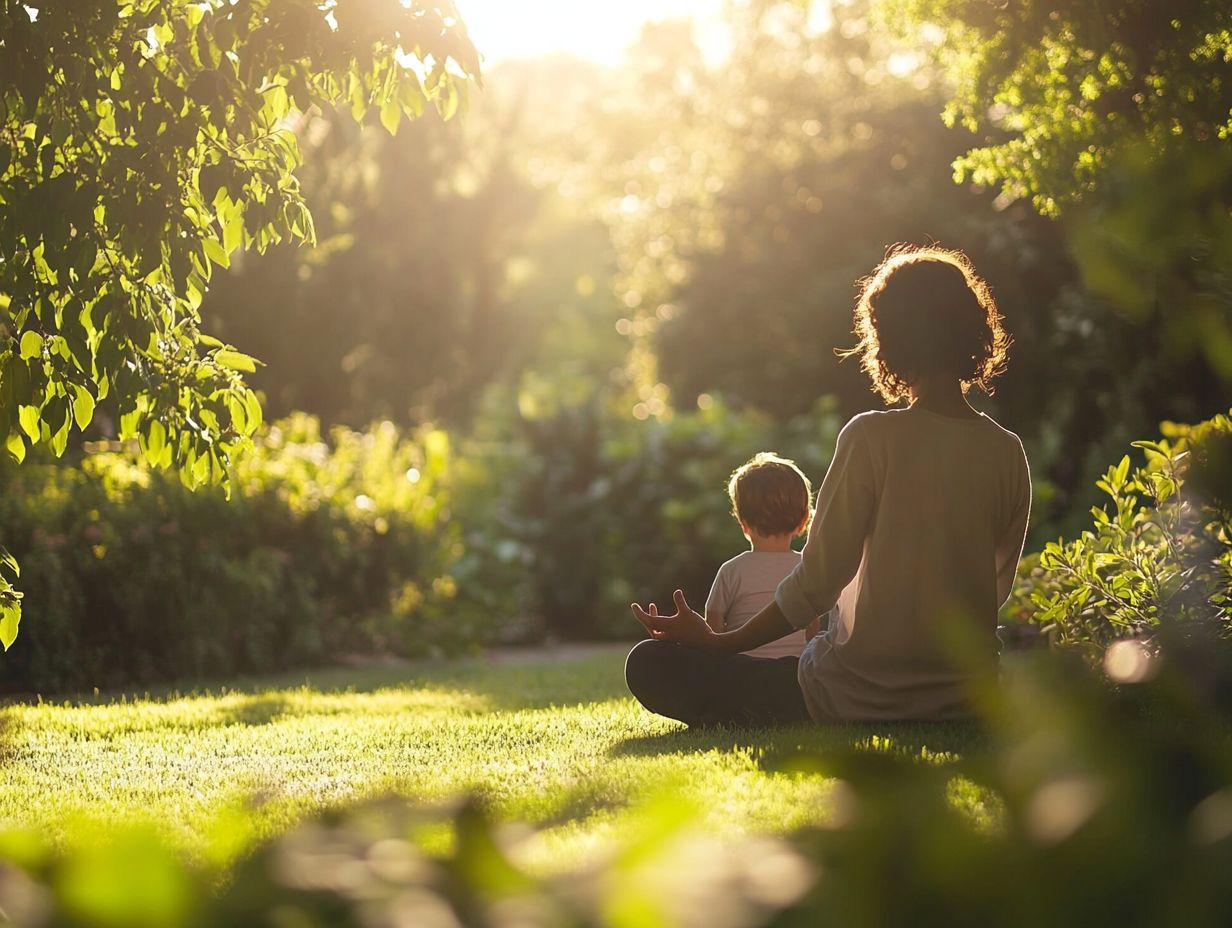
Mindfulness is the practice of being fully present and aware in the current moment. It can help with parenting by allowing you to focus on your child and respond to their needs with patience and understanding.
2. Simple Ways to Bring Mindfulness into Your Busy Day!
Mindfulness can help you find balance by allowing you to tune in to your own needs and emotions. This awareness helps you regulate your reactions and find a calmer, more centered approach to parenting.
3. How can I incorporate mindfulness into my daily routine as a busy parent?
Finding small moments throughout the day to practice mindfulness can be helpful. This can include taking a few deep breaths while waiting for your child to finish a task, practicing mindful eating during meal times, or engaging in a brief meditation practice.
4. Can mindfulness help improve my relationship with my child?
Yes, mindfulness can help improve your relationship with your child by allowing you to be more present and attentive to their needs. It also enhances your ability to communicate effectively and respond to conflicts with patience and understanding.
5. Is it possible to practice mindfulness while juggling multiple tasks as a parent?
Absolutely! You can practice mindfulness even when juggling multiple tasks as a parent. The key is to focus on one task at a time and bring your full attention to it. This focus helps you feel more grounded and less overwhelmed.
6. Can mindfulness also benefit my child?
Absolutely. Children can benefit from practicing mindfulness as well. It helps them manage their feelings, improve their focus and attention, and foster a sense of calm and well-being. Mindfulness principles also help children become more aware of their emotions and develop compassion for others.

